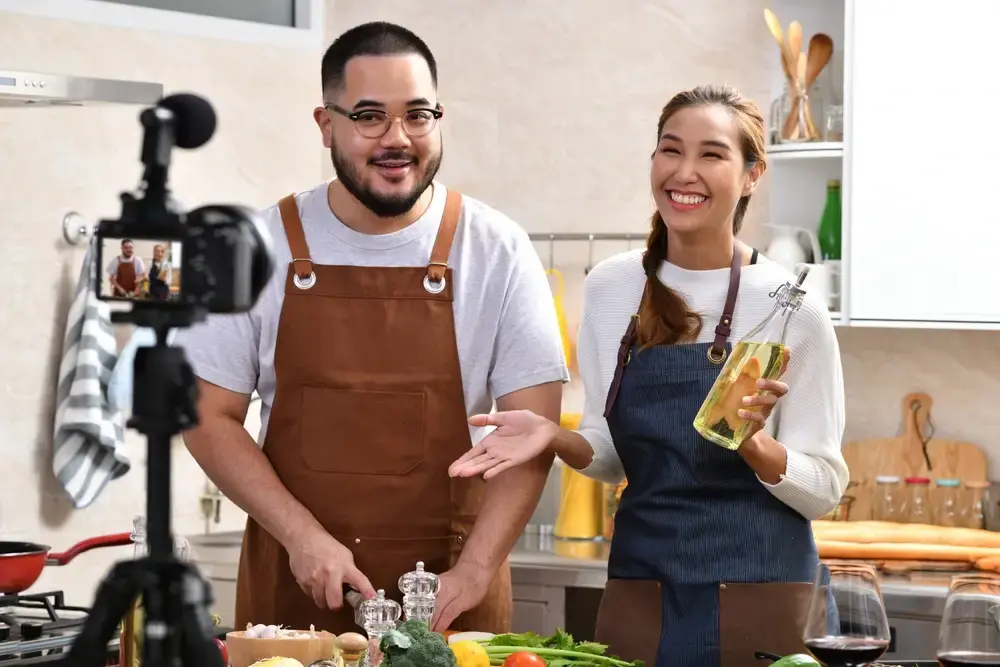A Guide to How Food Influencers Can Help eCommerce Food Businesses




Imagine scrolling through your social media feed and stumbling upon a mouth-watering video from your favorite food influencer. You watch them prepare a recipe using ingredients from an online grocer—inspired, you make a purchase. This buying process happens more often than you might think.
Influencers have become an integral marketing avenue, significantly influencing consumer choices, especially when paired with a strong online presence—such as selling through an eCommerce online store that makes it easy for followers to purchase featured products.
Their recommendations hold immense sway, with many consumers purchasing based on influencer endorsements.
The food and beverage (F&B) industry is no exception. Social media platforms are brimming with professional chefs, home cooks, viral food trends, and food reviewers. They’re a powerful force in reaching and converting customers. This guide will help you understand a food influencer’s potential role in your online food business and how to co-opt their reach for your benefit.
This guide will help you understand a food influencer’s potential role in your online food business and how to co-opt their reach for your benefit.
Food influencers are content creators who leverage their expertise, creativity, and personality to inspire and guide audiences in the dining or culinary fields. They cater to their audience's interests and provide valuable insights and recommendations through restaurant reviews, food trends, recipe tutorials, and engaging food-related content.
There are three general types of food influencers, though many have unique niches or overlapping subgroups. They are:
These influencers share recipes and cooking tips for foodies and aspiring cooks to enjoy. Some explore unrealistic or extreme recipes, while others give practical cooking advice and hacks.
Food influencers in this category include renowned celebrity chefs like Gordon Ramsey and local chef JP Anglo (@chefjayps) of Sarsa Manila, self-taught creators like Binging with Babish, who recreates iconic dishes from pop culture, and Panlasang Pinoy, who specializes in Filipino cuisine.

Unlike professional critics, food reviewers in this category are often passionate amateurs, making their content more relatable and accessible to a broader audience. Many TikTok food influencers rely on honesty and personality, providing reviews of foods that an ordinary person can access rather than judging Michelin-star dining experiences for being overhyped.
Popular examples include Pia Reyes Garde (@piareyrey), who reviews popular and indie restaurants in the Philippines, and former MMA fighter turned TikTok food reviewer Kieth Lee (@keith_lee125), who makes entertaining reviews of chain establishments.
This group of influencers comprises individuals passionate about food and sharing their experiences with their followers. They document their culinary adventures, highlight hidden gems, explore local food scenes, and even travel the world to immerse themselves in diverse culinary cultures.
Their videos showcase an establishment’s offerings and are often feature-oriented, non-critical, and unstructured.
Notable food vloggers include Karissa Dumbacher (@karissaeats), a cruise ship singer exploring cuisines worldwide. For a local example, FEATR is a popular Philippine food influencer on YouTube, known for its lifestyle vlogs that frequently feature their favorite local food discoveries and culinary stories.
Collaborating with food influencers can yield numerous benefits for your food business.
Food influencers have large, receptive audiences interested in F&B businesses. Collaborating with an influencer exposes your brand to an engaged audience, boosting brand awareness and reaching potential customers.

Food influencers can also sway consumer purchasing decisions. Their recommendations and endorsements, coupled with clear instructions on how to find your business, drive eCommerce traffic, increasing sales and revenue for your business.

Influencers wield substantial trust among their followers, rendering their endorsements highly credible. Collaborating with influencers who share your brand values can enhance your reputation and build trust within your target audience. This benefit is particularly helpful for fledgling F&B businesses, as they can borrow the influencer’s established credibility.
Food influencers are well-versed in emerging food trends and can provide valuable feedback for product development and innovation. Collaborating with them offers businesses insights into consumer preferences. For example, if a viral food challenge emerges, an influencer can guide your business on effectively using it.
Working with food influencers allows businesses to connect authentically with their target audience. Influencers excel at creating genuine and relatable content free from rigid corporate constraints. By partnering with influencers, your company can showcase its human side, building meaningful customer relationships.
Finding the right food influencers to collaborate with can be challenging, given the many available options. A successful partnership depends on compatibility between both parties. To identify, approach, and engage with the most suitable influencers, follow these steps:
Start by researching food influencers who align with your brand’s target audience, goals, and values. You can seek content creators who fit your niche, have an engaged following, and reflect your brand’s ethos and aesthetics.
Some influencers might already be patrons of your brand—keep an eye out for organic social media mentions. These influencers could be more open to collaboration and official endorsements.
For example, if your brand specializes in healthy foods, teaming up with fitness influencers who share diet tips or promote wellness brands would be a great fit.
Let your business's personality shine on social media by building a strong presence on major platforms. You should craft content that reflects your brand’s ideals, which can organically draw fitting influencers and help them decide if your business aligns with their interests. This approach might even lead influencers to initiate contact with you.
Examples of successful brand strategies include Wendy’s humorous posts and, though outside the industry, Angkas’ many viral posts.

Dive deeper into the metrics of potential candidates to assess their impact. When considering collaboration, prioritize influencers with a significant reach that can benefit your brand. Evaluate metrics such as follower count, likes, comments, and shares to gauge audience engagement and authenticity.
However, remember that a high follower count doesn't necessarily equate to effectiveness. A smaller but more active community might have a greater effect than a more popular creator with less engaged fans.

Your ideal influencer may not be open to collaborations or may not agree to certain types of endorsements. Reach out to candidates through personalized messages or emails to show your sincerity.
Communicate your objectives, expectations, and proposed collaboration. Then, engage in open and honest negotiations to establish a mutually beneficial partnership. Discuss and agree upon important terms such as content type, posting frequency, and compensation to ensure a healthy collaboration.
Once you establish a partnership or collaboration, there are some methods to ensure maximum impact.

Encourage influencers to maintain authenticity in their content. Their endorsement should be seamless from their usual videos. Also, emphasize the importance of disclosing sponsored collaborations to uphold transparency with their audience.
Authenticity and transparency build trust and strengthen your brand image. These traits also ensure the influencer’s recommendations and endorsements genuinely resonate with their followers.
Treat your collaborations with food influencers as professional partnerships. While engaging in light-hearted banter on social media is enjoyable, keep your professional dealings separate. Communicate expectations, deliverables, and timelines to ensure a successful business deal.
For your side, you should provide the necessary support and resources for the influencer to create high-quality content. For instance, it would be difficult to review your product if they haven’t tasted it, so understand you’ll have to send in samples.
Many explosive examples of failed influencer collaborations have led to backlash. They typically involved one or more of the following mistakes:

Memes and viral trends can have very short life expectancies. Continuously monitor industry trends, emerging food challenges, and popular food-related topics to stay ahead of the curve. After all, pushing a “dead meme” can have the opposite effect and hurt your brand reputation.
Be open to your partner influencers’ suggestions and opinions. They often better understand the space, enabling them to create content that aligns with current interests and demands.
Your collaboration shouldn’t be limited to the influencer’s content alone. Work together to develop a cohesive and engaging campaign. To maximize the partnership’s impact, incorporate their endorsement into other marketing efforts, such as your food packaging and product descriptions.
Additionally, you can create efforts to turn conversions into loyal customers. An online loyalty program can go a long way in creating repeat business. Your collaboration can be highly impactful if you optimize the rest of your processes around it.

In the food & beverage industry, influencers can have considerable influence and drive success for the eCommerce food business. With their captivating presence and persuasive impact, influencers can transform hidden gems into household names.
Collaborating with the right influencers can open doors to numerous opportunities. Leverage their reach, credibility, and creativity to elevate your brand within the industry.
While influencer marketing is a valuable strategy, a solid base is essential. RUSH offers advanced eCommerce solutions to support every stage of your online business journey, from initial discovery to seamless delivery. Contact our Sales Champs today!